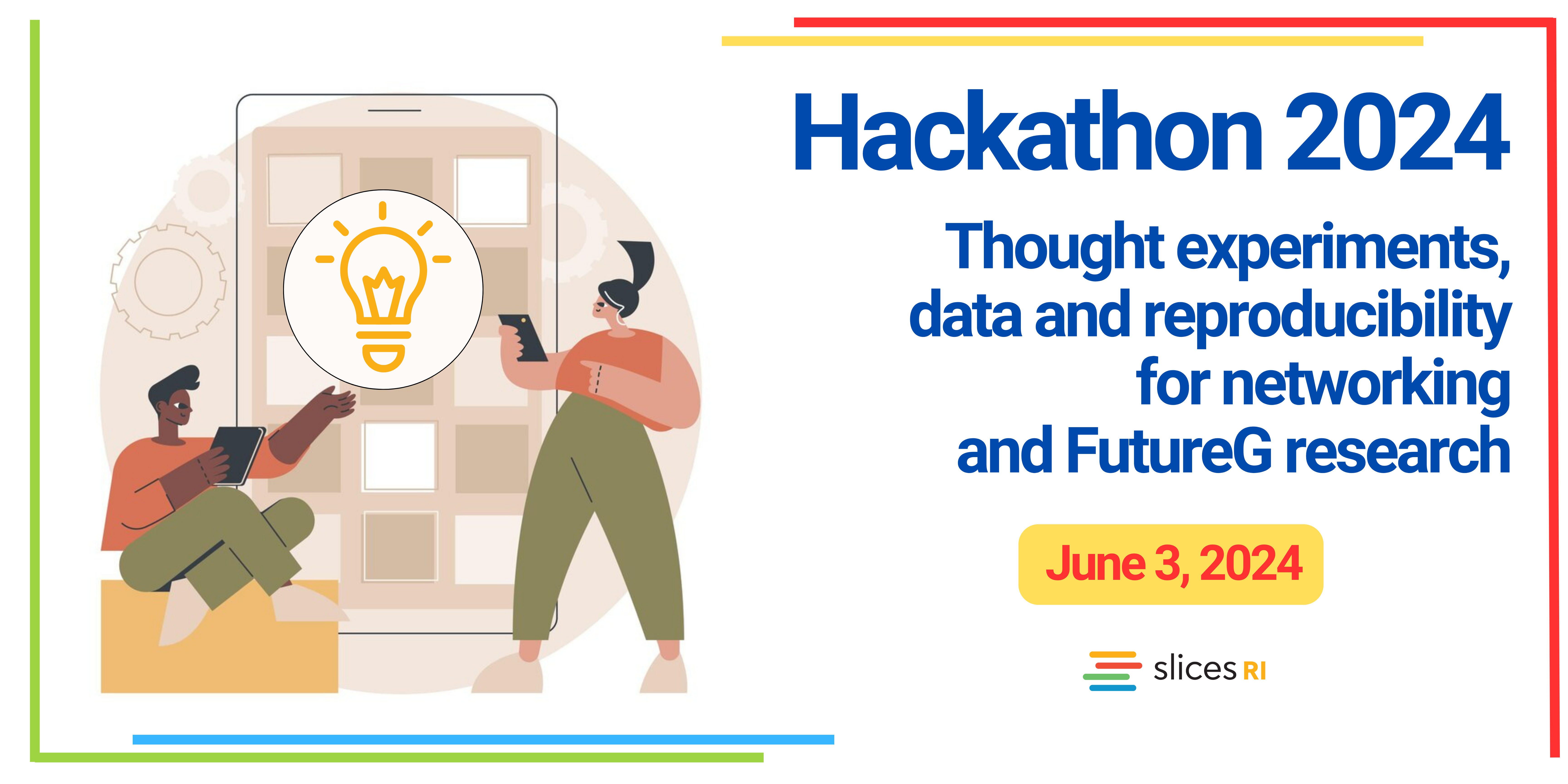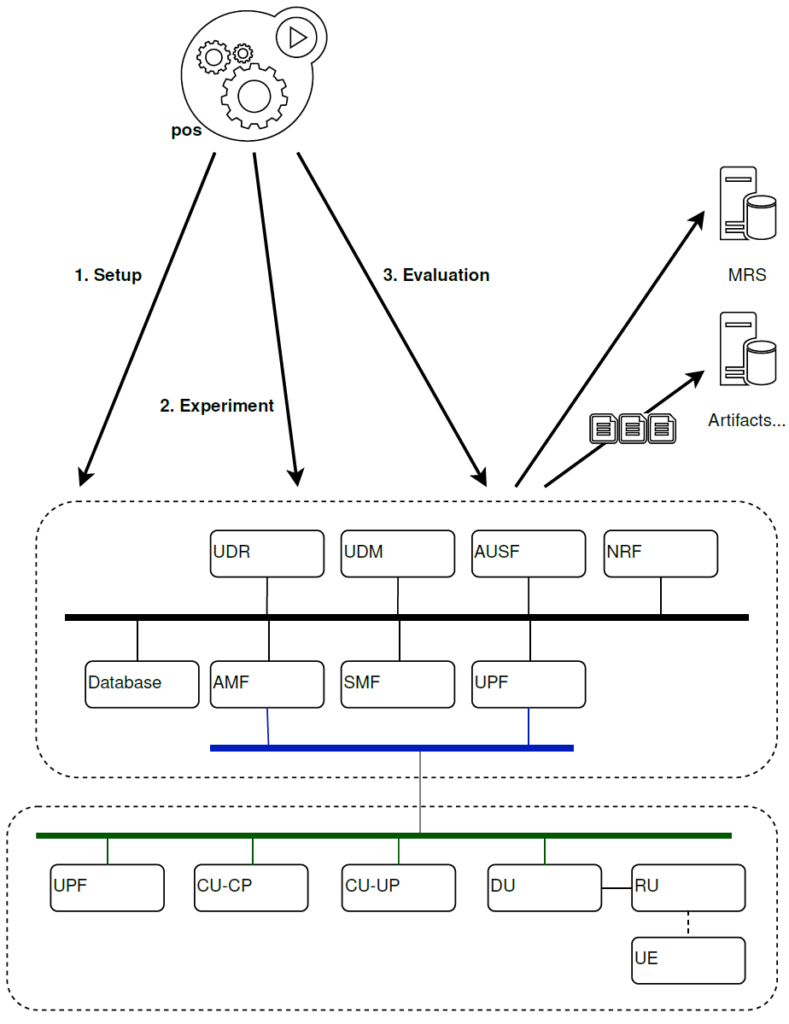
Thought experiments, data and reproducibility for networking and FutureG research: Hackathon 2024
Scope of the hackathon
Digital Infrastructures and the future Internet including 5G and beyond technologies are the main enabling factors contributing to the digital transformation of our society. Research and innovation in this domain represent an industrial need, a sovereignty concern, a security threat, and an economic and societal development opportunity.
Unfortunately, deploying a fully-fledged 5G network remains a matter of specialists that have to choose the right combination of software, hardware, and locations of the infrastructure. Even worth, when looking for high performance and complex, but real-life, scenarios, having a real 5G network is out of reach for the average researcher as it would require high expenses (specific radios and switches that cost tens of thousands of dollars) and know-how, limiting thus innovation to a small fraction of the community. This is where the SLICES Research Infrastructure (SLICES-RI) comes into play. The EU-funded SLICES-RI research infrastructure aims to provide a post-5G support to the research and innovation community. One important role of SLICES-RI is to provide long-term access to large scale distributed cutting-edge hardware and state-of-the-art deployments.
SLICES-RI relies on blueprints and their associated support to allow researchers to replicate and extend the work done by the community1. To reach this objective, the blueprints provide a set of replicable tools, software, hardware, and methodologies to make sound experimental research with cutting-edge 5G environments. As such, researchers worldwide can focus on their core research (e.g., testing a new frequency allocation scheme) and leverage the rest of the infrastructure offered by the community.
Experiments in SLICES are orchestrated by the plain orchestrating service (pos), which manages the experiment itself but also its setup and evaluation. This allows to archive all data and meta-data of experiments to allow sound analysis and reproducibility. The blueprint applies this methodology to deploy a fully-featured 5G network with a cloud-native core and split 7.2 radio access network. The blueprint is flexible enough to allow its deployment in fully virtual environments (e.g., in a public cloud) or with dedicated physical hardware on SLICES premises.

In this hackathon, we plan to bootstrap new software and features for the research community.
Important notice:This hackathon is a companion activity of the Thought experiments, data and reproducibility for networking and FutureG research workshop.
The workshop and the hackathon will provide synergy as the workshop is related to test platforms at large while the hackathon looks at how to bootstrap new collaborative tools for test platforms.
The hackathon will be held exclusively in-person.
Topics of interest:
With this hackathon, we expect to contribute to the software and documentation of SLICES to simplify experiments for students and researchers willing to use SLICES-RI.
The objective of the hackathon is to improve blueprint implementations for SLICES, but always in a way that is beneficial beyond SLICES. As such results of the hackathon are not only usable in SLICES but can be beneficial for the entire research community or even broader, independently of SLICES.
We solicit project ideas complementing existing SLICES blueprints as follows (but not limited to):
- Improving automation and CI/CD of SLICES-RI (e.g., Ansible, Terraform…)
- Advanced wireless networking experimentation
- Smart/intelligent infrastructure operation and management (e.g., Rancher, Kubernetes, Keycloack, OpenID)
- Design and validation of new Edge/Fog/Open RAN infrastructures
- Methodology for designing and operating a scientific instrument
- API backend and Frontend
- Integration of bare metal and physical custom resources into cloud environments (e.g., k8s CRD)
Important Dates
- Expression of Interest (EoI) submission: March 21, 2024
- Feedback on EoI (notification): April 25, 2024
- Notification of travel expenses coverage: May 2, 2024
- Final Lightning talk slides: May 2, 2024
- Hackathon date: June 3, 2024
Hackathon Project submission
Projects proposals are to be submitted by email with the submission of an Expression of Interest (EoI) to the workshop co-chairs nimakris@uth.gr and damien.saucez@inria.fr in the form of an abstract that must explain:
- a proposed team of a maximum of 4 persons (minimum 1 person) with the identification of its leader;
- a 200 words summary of the project;
- a workplan with the different milestones to be achieved the day of the hackathon and potential extensions;
- an explanation of why the project would be beneficial to SLICES-RI and to the whole research community.
The format can be a PDF or a link to a git repository clearly documented.
The name and email address of each member of a proposed team must be provided in the EoI.
To promote openness and reproducibility authors and reviewers are not anonymous and it is expected to have interactions between the authors and reviewers during the review process.
All code produced during the hackathon will be done under a public, free, and open-source license.
Team members engage to physically attend the hackathon if their EoI is selected.
Hackathon Prizes
Travel expenses for the leader of the best two project proposals will be covered. This decision will be taken collectively by the TPC and openly based on the novelty of the proposition, its potential usage by a large community, and its originality.
The winning team of the day will get privileged access to the next SLICES Open Call, offering support to further projects of the team members that would leverage SLICES-RI.
TPC Co-Chairs
- Damien Saucez, Inria
- Nikos Makris, University of Thessaly
Technical Program Committee Members
- Armir Bujari (University of Bologna)
- Attila Farkas (Számítástechnikai és Automatizálási Kutatóintézet – SZTAKI)
- Serge Fdida (Sorbonne Université)
- Sebastian Gallenmüller (Technical University of Munich)
- Carmen Guerrero (University Carlos III of Madrid – UC3M)
- Nikos Makris (University of Thessaly)
- Raymond Knopp (Eurecom)
- Andrea Passarella (Institute of Informatics and Telematics CNR)
- Michele Polese (Northeastern University)
- Esa Posio (Oulu University)
- Damien Saucez (Inria)
- Ivan Seskar (Rutgers University)
- Thanasis Korakis (UTH)
- Brecht Vermeulen (IMEC)
